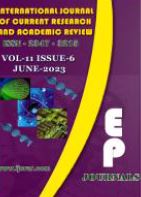Abstract Volume:11 Issue-6 Year-2023 Original Research Articles
 |
Online ISSN : 2347 - 3215 Issues : 12 per year Publisher : Excellent Publishers Email : editorijcret@gmail.com |
Biochar is the by-product of biomass pyrolysis in an oxygen depleted atmosphere. It contains porous carbonaceous structure and an array of functional groups. Biochar’s highly porous structure can contain amounts of extractable humic-like and fluvic-like substances. Moreover, its molecular structure shows a high degree of chemical and microbial stability. The physical and chemical properties of biochar are highly dependent on pyrolysis temperature and process parameters, such as residence time and furnace temperature, as well as on the feedstock type. Recent increases in atmospheric greenhouse gas levels require that novel approaches are undertaken to mitigate impacts of climate change, such as management practices conducive to improved soil carbon sequestration. Water usage has been rising immensely with growing population and industrial activities in both developed and developing countries. This resulted in deterioration of water sources as various contaminants such as dyes toxic heavy metals, organic compounds like detergents, phenols, dyes, pesticides in addition to the other persistent organic pollutants are increasingly being dumped into the water bodies. Recently, char derived from biological materials under oxygen free condition, popularly known as “biochar” has been recently been introduced as an effective sorbent for various toxins. Biochar application as a soil amendment is motivated by its capacity to enhance crop yields and alter the soil physical, chemical and biological properties, such as soil water holding capacity, pH, cation exchange capacity, nutrient retention, and organic carbon. Biochar has been recently recognized as multifunctional material related to carbon sequestration, contaminant immobilization, greenhouse gas reduction, soil fertilization, and water filtration. Accordingly, biochar is presented as a promising soil amendment of high economic and environmental value.
How to cite this article:
Ewnetu Teshale. 2023. The Role of Biochar Amendments on Soil Properties, Waste water Treatment and Carbon Sequestration: A Review.Int.J.Curr.Res.Aca.Rev. 11(6): 85-92doi: https://doi.org/10.20546/ijcrar.2023.1106.007



Quick Navigation
- Print Article
- Full Text PDF
- How to Cite this Article
- on Google
- on Google Scholor
- Citation Alert By Google Scholar
